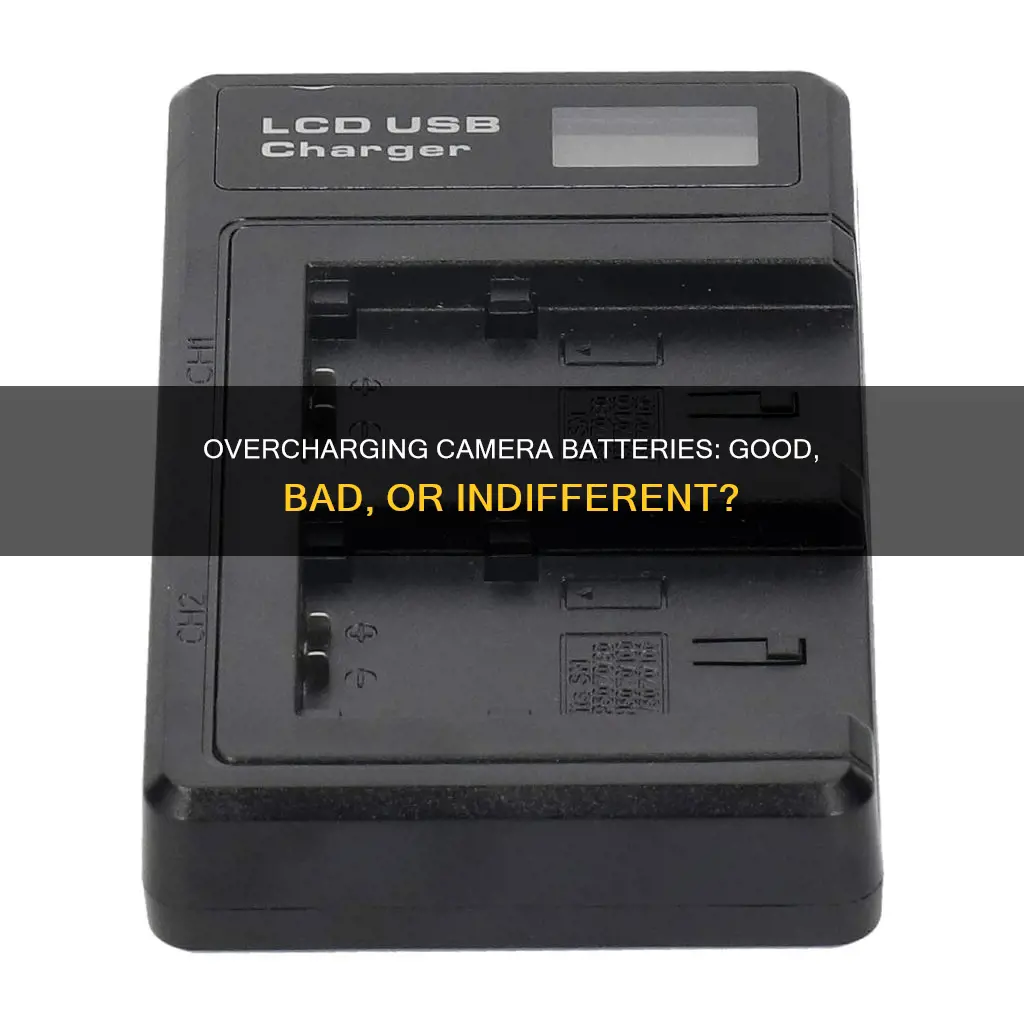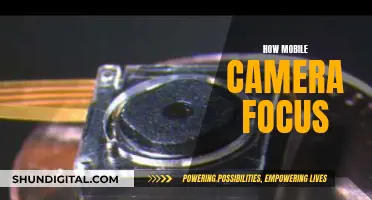
Overcharging your camera battery can be a concern for many photographers, especially those who use their equipment frequently. While modern camera batteries often have built-in protections to prevent overcharging, it's important to understand the potential risks and how to properly care for your battery to ensure optimal performance and longevity. In this article, we will explore the topic of overcharging camera batteries, addressing questions such as Can overcharging damage my battery? and How can I maintain my battery's health?
| Characteristics | Values |
|---|---|
| Can camera batteries be overcharged? | No, most modern camera batteries stop charging automatically when they reach full capacity. |
| What is overcharging? | Overcharging is when a battery is charged beyond its full capacity. |
| Is overcharging good for increasing battery life? | No, in the best-case scenario, a battery will lose some of its capacity. In the worst-case scenario, the battery will overheat, swell, and explode or start a fire. |
| Why don't camera batteries overcharge? | Most name-brand camera batteries have a built-in shut-off mechanism when they reach full capacity. |
| Can camera batteries be a fire hazard? | Yes, if a faulty battery is shipped and it somehow gets through the testing process, there is a risk of fire or explosion. |
| Should I use third-party batteries? | No, third-party batteries may be incompatible with the camera or charger, and may not have the same safety standards. |
| Will constant charging decrease my battery life? | Yes, even with name-brand cameras, constant charging can decrease battery life due to the heat generated by the charger. |
| How can I preserve battery life? | Remove the battery from the charger once it's fully charged, store it at a cool temperature, and don't fully drain the battery before charging. |
What You'll Learn

Modern camera batteries have built-in overcharge protection
While this feature is designed to protect the battery and camera from damage caused by overcharging, it is still important to follow the manufacturer's instructions for charging the battery and to avoid leaving it plugged in for extended periods after it has reached full capacity. This is because the heat generated by the charger can still decrease the battery's lifespan.
Additionally, it is important to use the correct charger for your camera battery. Using a third-party or incompatible charger can cause the battery to overheat, which can damage the battery and reduce its lifespan.
It is worth noting that while modern camera batteries have built-in overcharge protection, there is still a small risk of overcharging if the battery or charger is faulty. In rare cases, this can lead to the battery leaking, swelling, or even exploding. Therefore, it is important to follow the manufacturer's instructions and only use the charger that comes with the camera or one that is recommended by the manufacturer.
In summary, modern camera batteries are designed with built-in overcharge protection to prevent damage and ensure safe and proper charging. However, it is still crucial to follow the manufacturer's guidelines and use the correct charger to maintain the battery's performance and longevity.
Revitalizing Lithium-Ion Camera Batteries: Pro Tips for Photographers
You may want to see also

Keeping the battery in its charger can decrease its lifespan
Keeping a battery in its charger can indeed decrease its lifespan. This is because, once a battery is fully charged, keeping it in the charger will cause it to self-discharge and then recharge as it falls below full capacity. This process of recharging after a small amount of self-discharge is known as a "charging cycle", and lithium-ion batteries can only go through around 1000 charging cycles before they begin to lose their charge capacity. Therefore, keeping a battery in its charger can reduce its lifespan.
Additionally, lithium-ion batteries are damaged by high temperatures, and the self-discharge rate is higher at warmer temperatures. So, if a battery is left in a charger, the self-discharge process will occur faster and generate more heat, which will further damage the battery.
It is also worth noting that keeping a battery at a high level of charge puts strain on it. This is because the lithium cobalt oxide layer, one of the two layers in lithium-ion batteries, is under stress when it is either full or empty. Therefore, keeping a battery in its charger and at a high level of charge for a prolonged period can damage the battery.
However, it is important to note that modern smartphones and wall chargers are designed to manage power effectively and prevent overcharging. They do this by gradually reducing the amount of current as the battery fills up and by shutting off power once the battery is full, even if it remains plugged in. Therefore, the negative effects described above are likely to be minimal for smartphone users.
Charging Camera Batteries: A Global Guide
You may want to see also

Overcharging can cause a battery to overheat, swell, and explode
Overcharging can indeed cause a battery to overheat, swell, and explode. This is due to the chemical composition of lithium-ion batteries, which are commonly used in modern devices such as smartphones and cameras. When a lithium-ion battery is overcharged, it overheats, causing the acid inside to boil. This boiling acid creates a flammable gas and increases the pressure inside the battery. If the pressure doesn't cause the battery to explode, the flammable gas could be ignited by a spark, leading to an explosion that sends metal and acid flying.
While modern devices and chargers have built-in protections to prevent overcharging, it is still possible for batteries to be overcharged due to manufacturing faults, poor-quality hardware, or physical damage. Additionally, keeping a battery in its charger for extended periods of time can decrease its lifespan because of the heat generated by the charger. High temperatures can accelerate self-discharge and have a detrimental effect on the battery. Therefore, it is recommended to remove the battery from the charger once it has reached full capacity and to store it at a cool temperature.
To enhance the lifespan of your battery, it is also suggested to limit charging to 80% of its full capacity and to avoid letting it drop below 20%. Using original or certified power chargers is also important, as off-market chargers may not meet the required safety standards. Regularly inspecting your camera batteries and ensuring the electrical contacts cannot be shorted is another way to maintain safety.
While the chances of a battery explosion are slim due to safety measures put in place by manufacturers, it is still crucial to follow best practices for battery care and maintenance to minimize potential risks.
Charging Your Alto Camera: A Quick Guide
You may want to see also

Chargers produce heat, which can reduce battery life
Lithium-ion batteries, including those found in smartphones and cameras, can generate heat while charging. This heat can accelerate the ageing of the battery, reducing its performance and lifespan. It is recommended to remove the battery from the charger once it has reached full charge to prevent potential damage.
The heat generated by chargers can cause the battery to reach temperatures higher than the ideal storage temperature for lithium-ion batteries, which is around 15°C or 59°F. Charging a battery will typically cause it to exceed this temperature, and leaving it in the charger for an extended period can further increase the temperature, causing accelerated degradation.
Additionally, the heat produced by chargers can contribute to the build-up of excessive heat in the surrounding environment. For example, charging a phone under a pillow or blanket can restrict ventilation and cause the phone to retain heat. This can also accelerate battery ageing and reduce its lifespan.
To maximise battery life, it is important to avoid exposing batteries to high temperatures and to remove them from their chargers once they have reached full charge. Storing batteries at cool temperatures and avoiding constant charging can help preserve their lifespan.
Charging Your X10 Camera: A Step-by-Step Guide
You may want to see also

Tips to enhance your battery's lifespan
- Avoid overcharging: Leaving your device plugged in after it hits 100% can cause damage and reduce the performance and lifespan of the battery.
- Avoid extreme temperatures: Do not expose your device to temperatures above 95°F (35°C), as this can permanently damage battery capacity. Even storing a battery in a hot environment can irreversibly damage it.
- Remove certain cases during charging: Charging your device inside a thick case may generate excess heat, which can affect battery capacity.
- Store at room temperature: Keep your device in a cool, moisture-free environment. Extreme heat, cold, or dampness can prematurely drain your battery and affect its longevity.
- Store it half-charged for long-term storage: If you plan to store your device for a long period, charge it to around 50% and store it in a cool, dry place. Storing a device when fully charged or discharged for an extended period can lead to reduced battery capacity.
- Adjust screen brightness: Turn down the brightness of your screen to help preserve battery life.
- Use power-saving mode: Many devices offer a power-saving mode that turns the screen to black and white, darkens the display, and turns off non-essential wireless features.
- Limit location services: Check your settings so that apps are only tracking your location when you're using them.
- Turn off background app refresh and updates: Apps that continue to run in the background eat up battery life over time. You can put unused apps to sleep or manually turn them off when not in use.
- Turn off wireless services when not in use: Wi-Fi, Bluetooth, and mobile data use up battery life, so turn them off when you don't need them.
- Keep your device up to date: Download and install all updates to the operating system when they are available, as manufacturers often introduce new ways to improve power management.
Charging the 808 Camera: Long First Charge Needed?
You may want to see also
Frequently asked questions
Yes, keeping your camera battery in its charger for extended periods can decrease its lifespan. This is due to the heat generated by the charger.
Overcharging is when a battery is charged beyond its full capacity. This can cause the battery to overheat, swell, and explode or catch fire.
Most modern camera batteries stop charging automatically when they reach full capacity. To prevent overcharging, remove the battery from the charger once it has finished charging.







